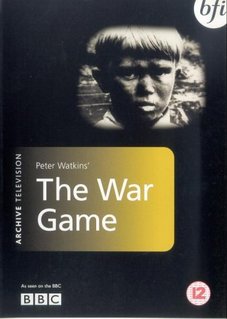The War Game

At a time when hawkish neo-cons sit atop of the governmental hierarchy of the
A faux documentary made in 1965, The War Game details the potential event of a nuclear attack on a major English city. It illustrates the build-up of preventative ground activities, such as citizens being moved out of their own homes and into the houses of other, usually uninviting, people, and the regular sandbagging procedures that we always see in these circumstances. Then we witness the actual event of the nuclear blast and the consequences to follow. It also outlines numerous discrepancies in the British government’s preparatory measures.
Set-up in many ways as a simple information film, the sort that would have been widely seen during the Second World War, the film’s grainy black and white images, matter-of-fact narration, and ‘expert’ testimonies have a powerfully profound effect in terms of replicating both the medium it aims to duplicate and reality itself. The film won the Best Documentary Oscar at the 1967 Academy Awards, although it is essentially a piece of fiction.
The film’s central point is to highlight the insanity evident in nuclear warfare, and does so expertly. Every powerful leader on the globe, whether it’s a nuclear or non-nuclear state, should watch this film; it’s a message that isn’t simply conferred by language, the images in the film of the nuclear detonation and fallout are very thought provoking. From the old ladies suffering from deep psychological trauma, to the man verging on a breakdown at the thought of his children growing up with potential radiation-induced cancers, or the young causalities with burns on their eyes and arms.
It’s fundamentally an anti-nuclear statement; it brings together parallels of the hypothetical attack with the bombings of
To go back to my opening sentence, this film is obviously still pertinent to the world situation, regardless of the official end of the Cold War. We can see this with the Nuclear Non-Proliferation Treaty authority being flouted as the US reviews it’s stance on nuclear weapon use (concerning issues of pre-emptive attack), the desire of certain countries to attain nuclear weapons (in some cases as a preventative measure, a resurfacing of the old Cold War mentality), and rogue, countryless groups like Al-Qaeda exist, determined to push forward their militant movements. The War Game is frightening in many ways, and, hopefully, reminds us that during war (conventional or nuclear) it’s the ordinary citizens that are the ones to suffer.


2 Comments:
Just finished up my own online affairs and stopped by. I will say this one caught my eye and is delaying my breakfast (which is especially cruel because the dry weetabix post above was mouth-watering). But I was thinking "Yes! A great deal of cold-war literature and film seems to have found new relevance in this era of 'hawkish neo-cons, etc. etc.'"
For me, it's Gregory Corso's poems that suddenly popped out as worth a read again.
But I must ask: this post has the feel of something written for a class. Is that the case? Certainly it was constructed in the style of a paper or essay.
Never read any Corso, I will rectify this promptly, I am a fan of the beats so this'll probably appeal to me.
Nah, it wasn't written for a class or anything. Just me doing straight-review style, it was also posted on Blogcritics, and the subject is worthy of a sensible approach anyway. I think it makes for a nice variety on the blog alongside some more, um, eccentric offerings.
Post a Comment
<< Home